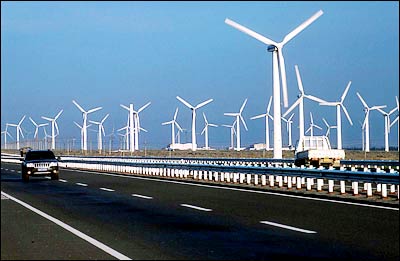The consumption of natural resources, including energy, minerals, water and land, keeps increasing along with rapid economic growth. China has made remarkable achievements in economic and social development over the last 20 years, but is paying an enormous resources and environmental price. China's mode of untrammeled economic development is characterized by high rates of growth, resource consumption and of pollution. At present, the consumption of energy, raw materials and water resources per unit of GDP is much higher than the world average; waste of resources in production, construction, distribution and consumption is still serious. Therefore, the Chinese government put forth the key strategic policy of building an energy-efficient society.
 |
China's Medium and Long-Term Energy Development Program for 2004 - 2020, adopted in principle by the State Council in June 2004, prioritizes energy conservation, and adjustment and optimization of the energy structure. China's first Medium and Long-Term Energy Conservation Plan formulated by the National Development and Reform Commission was published at the end of 2004. This lays down specific regulations for indices of energy consumption, covering thermal power generation, electricity supply and coal consumption, for major products. By 2010, these indices as a whole will reach or approach the international advanced level of the early 1990s. By 2010 the energy efficiency of important energy-consuming equipment, such as coal-fueled industrial boilers, must reach or approach international advanced level. The indices of some automobiles, electro-motors and household appliances should also be up to the international advanced level by 2010. Since 2005, China has started 10 key energy-conservation projects, such as the Transformation of Coal-fueled Industrial Boiler and Kiln, Development of Regional Combined Heat and Power (CHP) Plants, Energy Conservation of Electric Machinery, Green Lighting, Petroleum Conservation and Substitution, Waste Heat Utilization, Energy Conservation in Construction and Energy Conservation in Government Departments. It is estimated that by 2010 these projects will save the energy equivalent of 240 million tons of standard coal.
The general requirements for building an energy-efficient society are: paying equal attention to resource development and conservation, with conservation as the guiding principle, putting resource saving and greater utilization efficiency at the heart of things; emphasizing conservation of energy, water, materials and land, the comprehensive utilization of resources and the development of a recycling economy, establishing energy-efficient modes of production, consumption and of urban and rural construction.

